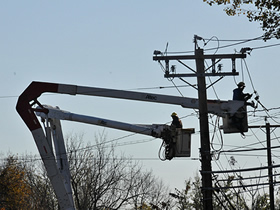Safety During Power Outages

The loss of power and heat for extended periods—often following severe storms and other natural disasters—can create potential safety risks in your home. As families prepare to use generators and alternate heat sources to keep warm, it is essential that they are aware of the risks and hazards to ensure personal safety. Flashlights and battery-powered lighting should be kept in the home and ready to use during a power outage. NEVER use candles as a light source. Generators should never be operated indoors and must be well vented to prevent fumes from entering a home.
Portable generator safety
- A generator should only be used outside on stable ground and away from any windows and vents to prevent deadly fumes from entering the home through an opening. Keep the generator dry. Operate on a dry surface under an open, canopy- like structure.
- Read the manufacturer’s instructions.
- Dry your hands before touching the generator.
- Plug appliances directly into generator or use a heavy-duty outdoor- rated extension cord. Make sure the entire extension cord is free of cuts or tears and the plug has all 3 prongs, especially a grounding pin.
- Do not connect the generator to your home’s wiring. Power can flow out of your home into the electric system creating a hazard for crews working in the area.
- Never fill the generator with fuel while it is running or still hot. Turn it off and let it cool. Fuel spilled on hot engine parts could ignite.
- Always store fuel outside of living areas, away from fuel-burning appliances, in properly labeled, non-glass containers.
- You will not be able to use all appliances at once. You may have to turn off some appliances to avoid overload. And make sure any connected appliances are off before starting the generator.
- Generators should be used for emergency standby power ONLY and for short periods of time. Refrigerators do not need to run 24 hours a day to keep food fresh. Monitor the internal temperature, which should be kept at 40 degrees or below.
- Make sure you have working, properly installed carbon monoxide (CO) alarms in your home. CO is an odorless, colorless gas produced by fuel combustion that can make you ill with flu-like symptoms and in extreme cases can be fatal.
General heating safety
- If the heat goes out in your home, keep warm by wearing several layers of clothing and a wool hat. Close off rooms you do not need and use only safe alternative sources of heat, like wood and other fuel-burning stoves. Also, eat well-balanced meals and high energy food to allow your body to produce its own heat.
- Keep anything that can burn or that is flammable at least three feet away from heating equipment, like the furnace, fireplace, wood stove, or portable space heater.
- Have a three-foot “kid-free zone” around open fires and space heaters.
- Never use your oven to heat your home.
- Remember to turn portable heaters off when leaving the room or going to bed.
- Always use the right kind of fuel, specified by the manufacturer, for fuel burning space heaters.
- Make sure the fireplace has a sturdy screen to stop sparks from flying into the room. Ashes should be cool before putting them in a metal container. Keep the container a safe distance away from your home.
- Make sure you have working, properly installed smoke detectors throughout your home.
General power outage safety
- Assume all downed wires are live. Avoid downed wires or any objects that are in contact with them. Call and notify the utility company or 911 of a downed power line immediately.
- Many injuries can occur in the aftermath of a storm as people come in contact with debris and other hazards. Wear sturdy, hard-soled shoes or boots, long sleeves and gloves when handling or walking near debris to prevent injuries from hazards such as nails and broken glass.
